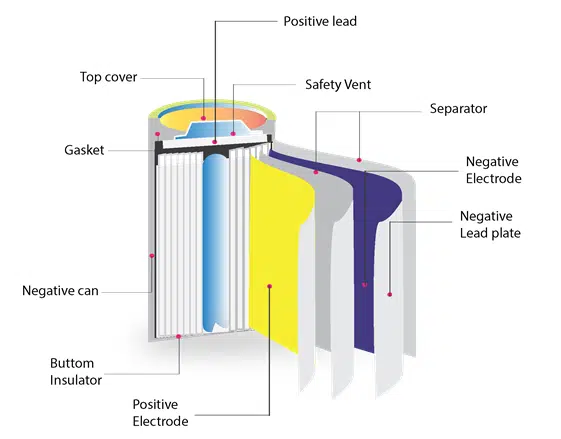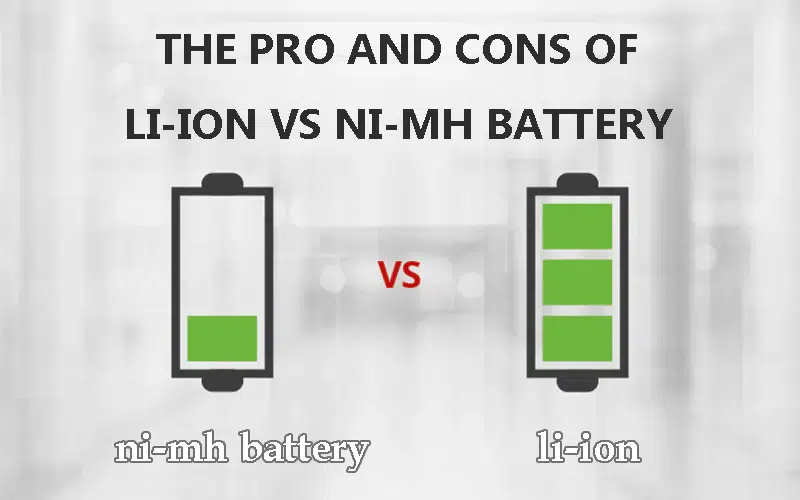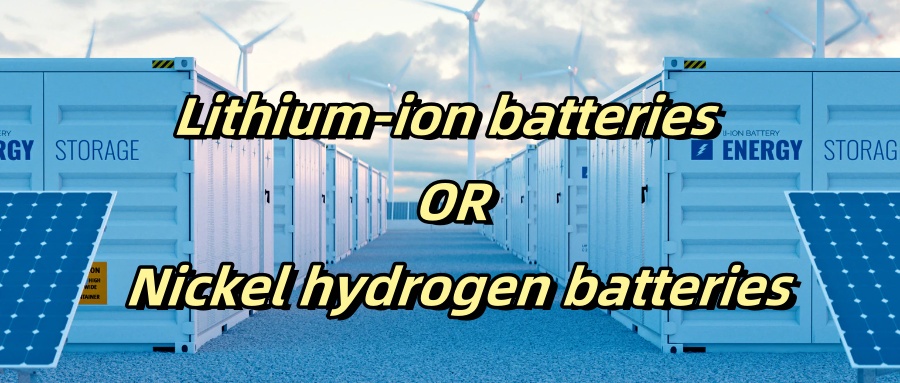
Ni MH 또는 Li 이온 배터리: 어느 것이 당신에게 더 적합합니다?
이 기사는이 두 가지 유형의 배터리의 주요 특성을 이해하는 데 도움이되는 두 가지 간의 심층적 인 비교를 제공합니다..
자신에게 적합한 현명한 선택을하겠습니다.
배터리의 NIMH는 무엇을 의미합니다?
NIMH는 니켈 금속 하이드 라이드 배터리의 개념을 나타냅니다., 이는 니켈 금속 하이드 라이드 배터리임을 의미합니다.
니켈 금속 하이드 라이드 배터리는 무엇입니까??

니켈 금속 수 문자 (NIMH) 배터리는 환경 문제로 인해 단계적으로 폐지 된 니켈 카드뮴 배터리를 점차 교체합니다..
NIMH 배터리는 수산화 니켈로 만든 양극 전극과 수산화 칼륨의 전해질 용액으로 구성됩니다..
음성 전극은 수소 원자를 흡수 할 수있는 금속 합금으로 만들어집니다. (일반적으로 수소 흡수 합금이라고합니다), 니켈 기반 배터리가 독특합니다.
각 NIMH 배터리 셀은 1.2V 전압을 생성 할 수 있습니다.. 높은 에너지 밀도와 커패시턴스로 인해, NIMH 배터리는 가장 효율적인 니켈 기반 배터리 중 하나로 간주됩니다..
NIMH 배터리는 두 가지 유형으로 나뉩니다: 밀봉 및 환기 (열려 있는).
휴대 전화와 같은 다양한 장치에서 널리 사용됩니다, 카메라, 비상 조명, 노트북, 하이브리드 차량.
배터리의 Li-ion은 무엇을 의미합니다?
이것은 리튬 이온을 쓰는 방법입니다, 리튬 이온 배터리임을 의미합니다.
리튬 이온 배터리 란 무엇입니까??

리튬 이온 배터리는 충전식 리튬 이온 배터리에 속합니다, 그리고 그들의 설계와 기술은 시장에 나와있는 대부분의 배터리에 비해 더욱 진보됩니다..
리튬-이온 배터리의 음극은 주로 리튬 금속 산화 리튬으로 구성됩니다., 양극은 일반적으로 구리 필름으로 코팅 된 흑연으로 구성됩니다..
배터리의 전해질은 리튬 소금을 함유 한 유기 용매입니다..
니켈 수소 배터리에 비해, 리튬 이온 배터리 셀은 에너지 밀도가 높고 최대 3.6V의 전압을 출력 할 수 있습니다..
다음은 리튬 배터리의 일반적인 사양입니다:
NIMH 배터리 대 리튬 이온 배터리: 어느 것이 더 나은지?

기술적 인 관점만으로, 리튬 이온 배터리는 니켈 수소 배터리보다 반드시 "더 나은 "다고 간단히 말할 수는 없습니다..
둘 사이의 화학적 특성에는 상당한 차이가 있기 때문에.
성능면에서, 리튬 이온 배터리는 여러 측면에서 Ni-MH 배터리를 능가합니다.
예를 들어, 리튬 이온 배터리의 수명은 일반적으로입니다 5 연령, Ni-MH 배터리의 수명은 그 사이입니다 2 그리고 5 연령.
리튬 이온 배터리는 충전 속도가 빠르며 극한 온도에서 우수한 성능을 유지할 수 있습니다..
그리고 Ni-MH 배터리보다 충전주기가 길어집니다..
하지만, Ni-MH 배터리는 비용 이점이 있습니다.
투자 비용은 리튬 이온 배터리보다 훨씬 낮습니다.. 그리고 거의 추가 유지 보수가 필요하지 않습니다.
Ni MH 배터리는 환경에 더 작은 영향을 미칩니다..
그리고 운송하기가 더 쉬울 것입니다, 운송 중에 리튬 이온 배터리가 따라야한다는 엄격한 규정에 따라.
Ni MH 또는 Li 이온 배터리: 그들의 장점과 단점
리튬 이온 배터리와 니켈 수소 배터리를 비교할 때, 자신의 필요에 따라 장점과 단점을 평가하는 것이 중요합니다..
이것은 특정 요구 및 사용 시나리오에 더 적합한 배터리 유형을 결정하는 유일한 방법입니다..
니켈 금속 하이드 라이드 배터리의 장점
AA 및 AAA와 같은 표준 크기로 생산됩니다., 수많은 장치와 완벽하게 호환됩니다.
제조 공정 동안, 활성 물질의 함량은 상대적으로 낮습니다, 그것은 그들이 더 안전하다는 것을 의미합니다.
그들은 완전히 배출 될 수 있습니다 0% 배터리 성능에 크게 영향을 미치지 않습니다.
리튬이온 배터리에 비해, 가격이 낮고 비용 효율성이 높습니다.
사용 및 교통 측면에서, 비용이 낮습니다.
쉬운 운송을 원한다면, 당신은 그것을 고려할 수 있습니다.
니켈 금속 하이드 라이드 배터리의 단점
리튬이온 배터리에 비해, 니켈 수소 배터리는 자체 방전 속도가 높습니다.
일부 모델은 손을 잃을 수 있습니다 50% 한 달 안에 배터리 수명의 수명.
이 상황은 흔하지는 않지만, 선택할 때주의를 기울여야 할 것도 더 있습니다..
니켈 수소 배터리의 표준 전압은 1.2V입니다, 리튬 이온 배터리보다 낮습니다.
니켈 수소 배터리는 온도 변화에 민감하고 고온 환경에서 전압이 떨어질 수 있습니다..
니켈 수소 배터리의 충전 속도는 느립니다, 보통 복용 8 에게 12 시간.
이것은 충전 시간과 대조됩니다 3 에게 5 리튬 이온 배터리 시간.
빠른 충전으로 인해 니켈 수소 배터리가 손상 될 수 있습니다, 그러나 대부분의 리튬 배터리에는 성숙한 빠른 충전 기술이 있습니다.
리튬 이온 배터리의 장점:
리튬 이온 배터리는 배터리 용량이 높습니다, 일반적으로 2500mAh를 초과합니다.
평균 전압 등급은 매우 높습니다, 3.2V 이상. 대부분은 빠른 충전 기술을 지원합니다..
리튬 이온 배터리는 가벼운 것이 아닙니다, 그러나 비교적 사용하기에도 안전합니다.
그들은 넓은 온도 범위 내에서 작동 할 수 있습니다. -20 ℃ 60 ℃.
정상적인 사용하에, 리튬 이온 배터리의 수명은 최대까지 도달 할 수 있습니다 10 연령.
낮은 자체 퇴원률, 단지 3.5% 매월. 이것은 배터리가 오랫동안 저장되거나 유휴 상태이더라도, 전력 손실은 최소입니다.
리튬 이온 배터리는 다양한 장치와 호환성이 높으며 매일 유지 보수가 필요하지 않습니다..
리튬 이온 배터리의 단점:
높은 비용:
니켈 수소 배터리와 비교했습니다, 리튬 이온 배터리의 주요 단점은 더 높은 비용입니다..
회로 보호가 필요합니다:
리튬 이온 배터리는 과충전을 방지하기 위해 복잡한 보호 회로가 필요합니다., 오버 배출, 과열, 그리고 단락, 배터리 팩의 비용과 복잡성을 증가시킵니다..
환경 영향:
리튬 이온 배터리에 포함 된 리튬 및 기타 화학 물질은 환경에 영향을 미칩니다., 부적절한 취급은 환경 오염을 유발할 수 있습니다.
보안 위험:
극단적인 경우, 배터리 제조 결함과 같은, 과충전, 또는 외부 단락, 리튬 이온 배터리는 열 런 어웨이를 경험할 수 있습니다, 화재나 폭발로 이어짐.
충전주기 한계:
리튬 이온 배터리는 배터리 에이징을 가속화 할 수 있으므로 매우 얕은 충전주기를 겪어서는 안됩니다..
메모리 효과:
현대 리튬 이온 배터리의 메모리 효과는 중요하지 않지만, 배터리 건강을 유지하기 위해 재충전하기 전에 완전히 배출을 피해야합니다..
운송 및 보관 제한:
안전 고려 사항으로 인해, 리튬 이온 배터리는 운송 및 보관 중에 구체적이고 매우 엄격한 규정을 준수해야합니다..
이것은 물류 비용과 복잡성을 증가시킬 것입니다.
리튬 배터리와 동일한 니켈 수소 배터리입니다?
니켈 금속 히드 라이드 대 리튬 이온 배터리: 그것들은 동일하지 않으며 상호 교환 적으로 사용할 수 없습니다..
두 유형의 배터리는 충전식이 가능하며 다양한 공통 장치에 전원을 공급할 수 있습니다..
그러나 니켈 수소 배터리와 비교할 때, 리튬 이온 배터리는 더 많은 유형의 장치에 전원을 공급할 수 있습니다.
니켈 수소 배터리는 저렴하지만, 리튬 이온 배터리는 에너지 밀도가 높습니다 전압 니켈 수소 배터리보다, 더 적응력 있고 환경 친화적입니다.
리튬 이온 배터리 대 니켈 금속 히드 라이드 배터리의 적용
일부 측면에는 유사점이 있지만, 리튬 이온 배터리 니켈 수소 배터리에는 응용 시나리오가 다르며 사용합니다..
Ni-MH 배터리의 애플리케이션 범위:
니켈 수소 배터리는 순간 고전류를 제공하는 능력으로 알려져 있습니다., 한 번에 많은 양의 방전이 필요한 장치에 적합하게 만듭니다..
특정 요구 사항에 따라, 니켈 수소 배터리는 개별 배터리로 설계하거나 대형 배터리 팩으로 조립할 수 있습니다..
손전등과 같은 필드에서 널리 사용됩니다, 장난감, 휴대용 장치, 카메라, 전동 공구.
리튬 이온 배터리의 적용 구역:
대조적으로, 리튬 이온 배터리는 우수한 에너지 밀도로 유명합니다, 고전압, 그리고 대용량.
이러한 특성으로 인해 리튬 이온 배터리는 소비자 전자 제품 및 일일 응용 프로그램에 인기있는 선택으로 만듭니다..
그러므로, 오토바이에 적합합니다, 골프 카트, 전기 자동차, 및 태양 에너지 저장 솔루션.
Ni-MH 배터리 대신 리튬 이온 배터리를 사용할 수 있습니까??
사용 된 특정 장비에 따라 다릅니다.
그러나 보통 불가능합니다.
크기의 차이로 인해, 모양, Ni-MH 배터리와 리튬 이온 배터리 사이의 전압, 그들은 종종 상호 교환 적으로 사용할 수 없습니다.
장치가 두 배터리 유형과 호환되는 경우, 일반적으로 사용자 매뉴얼에 명확하게 언급됩니다.
Ni-MH 배터리를 완전히 배출 할 수 있습니까??
기술적 인 관점에서, Ni-MH 배터리는 "메모리 효과"의 영향을받지 않습니다., 그러나 그들의 전압은 시간이 지남에 따라 점차 감소합니다.
이 현상을 완화합니다, 3 개월마다 니켈 수소 배터리를 철저히 배출하고 충전하는 것이 좋습니다..
리튬 이온 배터리에는 이러한 작업이 필요하지 않습니다.
Ni MH 배터리 대 리튬: 충전식 배터리는 수명이 가장 길다?
리튬 이온 배터리와 Ni-MH 배터리를 비교할 때, 리튬 이온 배터리는 서비스 수명이 길고 자체 방전 속도가 낮습니다..
리튬 이온 배터리를 재충전 할 수 있습니다 4000 타임스, 대략 수명에 해당합니다 10 연령.
니켈 수소 배터리의 서비스 수명은 일반적으로 3 연령.
어떤 유형의 배터리가 더 안전합니다: NIMH 또는 리튬 배터리?
리튬 이온 배터리와 니켈 수소 배터리 비교, 니켈 수소 배터리는 비교적 안전합니다.
그러나 Ni MH 배터리도 온도 변화에 취약합니다..
과도한 온도로 인해 배터리가 과열 될 수 있습니다, 잠재적 인 화재 위험을 초래합니다.
리튬 이온 배터리는 온도 내성이 더 강합니다, 그러나 누출이나 연소와 같은 위험한 상황을 경험하면, 영향은 Ni MH 배터리보다 더 심각 할 수 있습니다..
리튬 이온 배터리와 니켈 수소 배터리 사이의 에너지 저장에 더 좋습니다.?

리튬 이온 배터리는 에너지 보유 측면에서 더 나은 성능.
NIMH 배터리는 자체 배출률이 높기 때문에 많은 양의 저장된 에너지를 잃습니다., 리튬 이온 배터리는 더 효과적으로 전력을 유지하고 전기를 오랫동안 유지할 수 있지만.
그래서 현재, 리튬 이온 배터리는 일반적으로 태양 에너지 저장 시스템에서 선택됩니다..
니켈 금속 하이드 라이드 배터리 또는 리튬 이온 배터리는 특수 충전기가 필요합니다.?
니켈 수소 배터리와 리튬 이온 배터리 사이의 충전 요구 사항에는 차이가 있습니다..
리튬 이온 배터리는 일반적으로 안전 모니터링 기능이있는 충전기가 필요합니다..
충전 상태를 추적 할 수 있어야하고 이상이 감지 될 때 자동으로 전원을 끕니다..
대조적으로, 니켈 수소 배터리의 충전 과정이 더 복잡합니다..
그들은“부동 비용”리튬 이온 배터리의 전압 특성.
일정한 전류 방법을 통해 니켈 수소 배터리를 충전해야합니다., 과충전은 쉽게 손상 될 수 있습니다.
그러므로, 니켈 수소 배터리의 충전은 일반적으로 단일 기술을 사용하지 않습니다., 그러나 안전을 보장하기 위해 여러 충전 방법을 결합합니다.
리튬 이온 배터리와 달리, 니켈 수소 배터리는 일반적으로 충전 중에 감독이 필요합니다.
충전기를 선택할 때, 배터리 유형 및 전압 요구 사항과 일치하는지 확인하십시오..
그렇지 않으면, 수명을 단축 할 수있을뿐만 아니라, 또한 배터리를 직접 손상시킵니다.
결론

이 기사를 읽은 후, 당신은 니켈 금속 하이드 라이드 배터리와 리튬 이온 배터리에 대한 포괄적이고 깊은 이해를 얻었습니다..
고품질 리튬 배터리를 찾고 있다면, 그런 다음 참조 할 수 있습니다 맨 위 7 리튬 이온 배터리 제조업체 2024.
